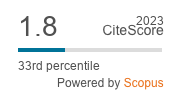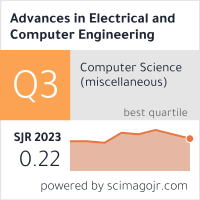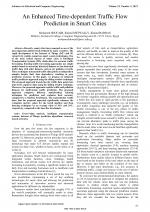| 3/2023 - 8 |
An Enhanced Time-dependent Traffic Flow Prediction in Smart CitiesSHOUAIB, M. |
| Extra paper information in |
| Click to see author's profile in |
| Download PDF |
Author keywords
data analysis, intelligent transportation systems, Internet of Things, prediction algorithms, recurrent neural networks
References keywords
prediction(14), traffic(13), flow(10), smart(8), data(7), model(6), intelligent(5), neural(4), intelligence(4), information(4)
Blue keywords are present in both the references section and the paper title.
About this article
Date of Publication: 2023-08-31
Volume 23, Issue 3, Year 2023, On page(s): 67 - 74
ISSN: 1582-7445, e-ISSN: 1844-7600
Digital Object Identifier: 10.4316/AECE.2023.03008
Web of Science Accession Number: 001062641900008
SCOPUS ID: 85172369475
Abstract
Recently, smart cities have emerged as one of the most important global trends initiated by many countries. The rapid development of the Internet of Things (IoT) and 5G connectivity enables numerous smart system technologies. One of the most critical aspects of smart cities is Intelligent Transportation Systems (ITS) which allow for accurate traffic forecasting. Existing traffic forecasting approaches use simple models based on univariate historical datasets or fuse historical traffic data with other datasets, such as air pollution records. These techniques interpreted traffic data points as independent samples despite their time dependency, resulting in poor prediction accuracy. In this paper, we propose an enhanced traffic prediction approach using the sliding window technique. The proposed approach transforms the traffic data points into time-series sequence data using the sliding window technique. Moreover, the proposed approach exploits traffic and pollution datasets for multivariate traffic prediction. The proposed approach compares different machine/deep learning techniques for prediction and evaluates their accuracy compared to a baseline benchmark. The experimental results show that the proposed approach significantly enhances the evaluation metrics values for the tested machine and deep learning techniques by an average value of 36% and 24%, respectively, compared to the base-line benchmark. |
| References | | | Cited By |
Web of Science® Times Cited: 0
View record in Web of Science® [View]
View Related Records® [View]
Updated 2 days, 16 hours ago
SCOPUS® Times Cited: 1
View record in SCOPUS® [Free preview]
View citations in SCOPUS® [Free preview]
[1] PRISMA on Machine Learning Techniques in Smart City Development, Ionescu, Ștefan-Alexandru, Jula, Nicolae Marius, Hurduzeu, Gheorghe, Păuceanu, Alexandrina Maria, Sima, Alexandra-Georgiana, Applied Sciences, ISSN 2076-3417, Issue 16, Volume 14, 2024.
Digital Object Identifier: 10.3390/app14167378 [CrossRef]
Disclaimer: All information displayed above was retrieved by using remote connections to respective databases. For the best user experience, we update all data by using background processes, and use caches in order to reduce the load on the servers we retrieve the information from. As we have no control on the availability of the database servers and sometimes the Internet connectivity may be affected, we do not guarantee the information is correct or complete. For the most accurate data, please always consult the database sites directly. Some external links require authentication or an institutional subscription.
Web of Science® is a registered trademark of Clarivate Analytics, Scopus® is a registered trademark of Elsevier B.V., other product names, company names, brand names, trademarks and logos are the property of their respective owners.
Faculty of Electrical Engineering and Computer Science
Stefan cel Mare University of Suceava, Romania
All rights reserved: Advances in Electrical and Computer Engineering is a registered trademark of the Stefan cel Mare University of Suceava. No part of this publication may be reproduced, stored in a retrieval system, photocopied, recorded or archived, without the written permission from the Editor. When authors submit their papers for publication, they agree that the copyright for their article be transferred to the Faculty of Electrical Engineering and Computer Science, Stefan cel Mare University of Suceava, Romania, if and only if the articles are accepted for publication. The copyright covers the exclusive rights to reproduce and distribute the article, including reprints and translations.
Permission for other use: The copyright owner's consent does not extend to copying for general distribution, for promotion, for creating new works, or for resale. Specific written permission must be obtained from the Editor for such copying. Direct linking to files hosted on this website is strictly prohibited.
Disclaimer: Whilst every effort is made by the publishers and editorial board to see that no inaccurate or misleading data, opinions or statements appear in this journal, they wish to make it clear that all information and opinions formulated in the articles, as well as linguistic accuracy, are the sole responsibility of the author.





